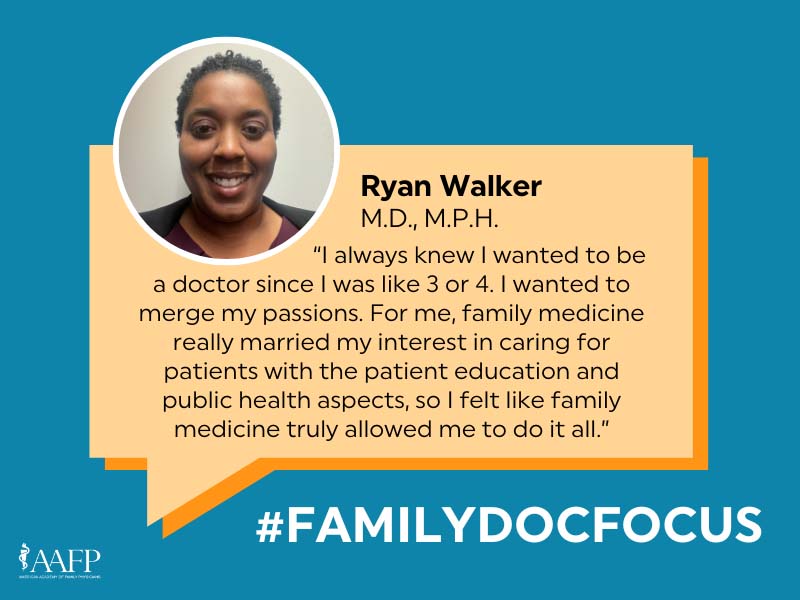Massachusetts Mentor Blazing Trail for Black Students
Oct. 17, 2024, David Mitchell — There wasn’t a singular mentor, rotation or patient experience that clinched family medicine as the specialty for Ryan Walker, M.D., M.P.H. Rather, it was the opportunity to pursue the things she loved most in a single specialty.

“I was heavily involved in advocacy and patient education,” she said. “I thought, ‘I need a specialty that is going to allow me to lean into my passions.’ From the ages of 15 to 22, I was doing a lot of reproductive health advocacy, locally and nationally. I would lobby Congress, do trainings in Washington, D.C., and then come home and work with local organizations specifically focused on HIV and sexual health education. I wanted to be able to continue doing this type of work within medicine. It’s part of my identity.”
Walker served in Advocates for Youth, as part of their National Young Women of Color Leadership Council, while in high school and college, and she also was a sexual health peer educator back home in Fort Lauderdale, Fla. She later held multiple leadership roles with the Minority Association for Pre-Health Students while an undergraduate at the University of Miami and served as co-president of the Student National Medical Association chapter at Tufts University School of Medicine in Boston.
As a resident at the Lawrence Family Medicine Residency in Lawrence, Mass., Walker was invited to participate in an online question-and-answer session with a group of Black medical students applying to family medicine residencies.
“I asked them if there’s anything else that they needed support in, and out of that was born a residency application series I led for three years,” she said.
Much more came out of that group, which officially was incorporated in 2021 as the Association of Black Family Medicine Physicians. Walker, a co-founder, served the organization as a board member and now is its executive director.
The students who started the group are now attending physicians, and the organization has grown to about 500 members.
“Our focus really is facilitating community, belonging and sharing information,” she said. “We really want to provide resources related to transitions — medical students going into residency and then residents going into the job market. We do a lot of webinars and assessments of what students need and really try to bridge those gaps. Many of our members are first-generation medical students, so there are a lot of questions about navigating finances, how to find research opportunities and things like that.”
The organization doesn’t charge membership dues, instead operating on donations and sponsorships. What started as a text group in January 2020 has branched out with in-person meetings the past two years during the AAFP’s National Conference of Family Medicine Residents and Medical Students, now known as Future: The National Conference for the Future of Family Medicine.
“This group had been in contact with each other and supporting each other since 2020, so that was really great when people could actually meet in person,” she said.
Walker also is working with students in her roles as clinical assistant professor in the Department of Family Medicine at Tufts University School of Medicine and as the family medicine clerkship site director at Lynn Community Health Center.
Students working with Walker see a wide range of services. She works in a Moms Do Care program, which provides prenatal and pediatric care, addiction treatment and psychiatric treatment for pregnant and parenting women who have a substance use disorder or a history of substance use disorder.
Walker also works one day a week at the health center’s outreach clinic, which is co-located within a soup kitchen.
“We’re caring for a lot of patients who are homeless or unsheltered but also often have dual diagnoses with psychological disorders and substance use disorders as well,” she said.
The outreach clinic is in the same building as a homeless shelter, which refers patients to the clinic. In addition to medical care, a case manager helps patients with needs like filling out housing applications or connecting them with community resources.
Yet another organization housed in that facility provides free testing for hepatitis C and sexually transmitted infections; offers harm reduction services such as needle exchanges; and connects people to addition care, which often leads them to Walker and her colleagues.
Lynn Community Health Center has yet another location where it cares for people with active medical conditions who also are unsheltered.
“They actually stay with us until they find a housing plan and are medically cleared,” said Walker, whose health center also provides home visits.
Walker is board-certified in family medicine and obesity medicine, and completed a fellowship in integrative medicine.
“I always knew I wanted to be a doctor since I was like 3 or 4,” she said. “I wanted to merge my passions. For me, family medicine really married my interest in caring for patients with the patient education and public health aspects, so I felt like family medicine truly allowed me to do it all.”